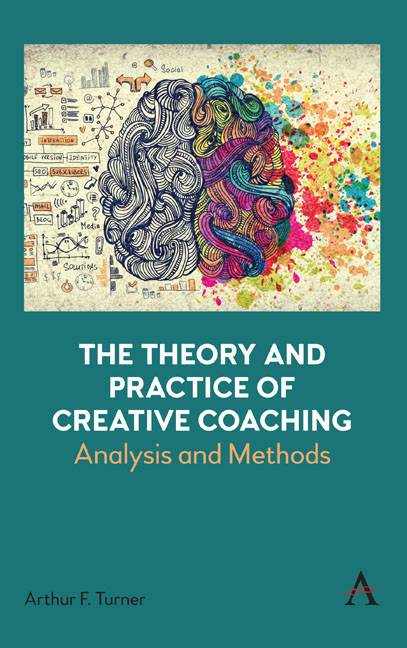Book contents
- Frontmatter
- Contents
- About the Author
- Preface
- Influences
- Introduction
- Section 1 Theory and Research
- Sections 2 and 3 Theory to Practice
- Section 2 Alternative Foci
- Section 3 Three Detailed Examples of Creativity in the Service of Executive Coaching (Walking, the Use of Finger Puppets and the Use of Music)
- Index
1 - Central Ideas and Reflections
Published online by Cambridge University Press: 28 February 2024
- Frontmatter
- Contents
- About the Author
- Preface
- Influences
- Introduction
- Section 1 Theory and Research
- Sections 2 and 3 Theory to Practice
- Section 2 Alternative Foci
- Section 3 Three Detailed Examples of Creativity in the Service of Executive Coaching (Walking, the Use of Finger Puppets and the Use of Music)
- Index
Summary
This book refers to executive coaching as a practice that has grown and developed in Europe and has distinct cultural differences and approaches to the coaching that is prevalent in America and Canada. Frameworks and models, in this European mode of executive coaching, are helpful in understanding the essential processes within a contracted executive coaching relationship. Good examples of frameworks and models include those espoused by David Clutterbuck's lifelong research into coaching and mentoring effectiveness (see The Mentoring Life Cycle – Best Practice, by David Clutterbuck and Gill Lane, 2004) whereby a coaching session or coaching relationship can be outlined with the reference to key parts of that time spent together. Such frameworks include many of the common factors (constituent parts) in coaching such as building rapport, contracting, agreeing on action and the ways forward. The ethical guidelines, published in June 2021, which is a code regularly updated by the European Council for Coaching and Mentoring and the Association for Coaching, are also helpful in this respect as they outline, in great detail, the behaviours and approaches deemed to be compatible with a coach following professional standards. Yet these guidelines and frameworks reveal little about what exactly happens within a coaching relationship. The episodes, insights, puzzlements, curiosities and moments of revelations that colour many executive–coaching interactions often emerge from an apparent muddle of ideas and reflections. The skill of the coach, therefore, lies in precipitating an understanding (an awakening, perhaps) on the part of the client/coachee – creating a ‘space’ for deeper thought and a more significant reflection on behaviour (Passmore et al., 2017). Creative techniques and a multiplicity of art-based approaches allow the coach to change tactics and apply methods (both spontaneously and intuitively) to both challenge and support the client's journey of discovery and development. This also has resonance in the field of leadership development and how ‘facilitators of learning’ can help by using a variety of approaches and ideas (Turner, 2019b).
During the past decade of research and discovery, when I had been working in the field of executive coaching and developing development programmes for aspiring coaches and mentors, four main ways emerged in which coaches could begin to introduce alternative approaches.
- Type
- Chapter
- Information
- The Theory and Practice of Creative CoachingAnalysis and Methods, pp. 7 - 12Publisher: Anthem PressPrint publication year: 2023

